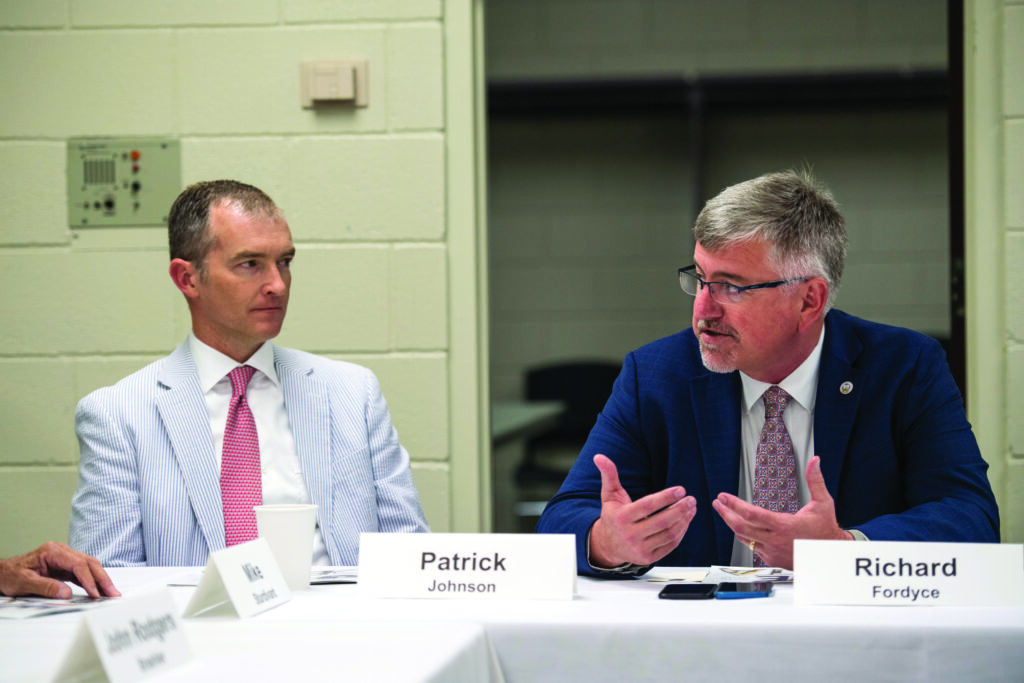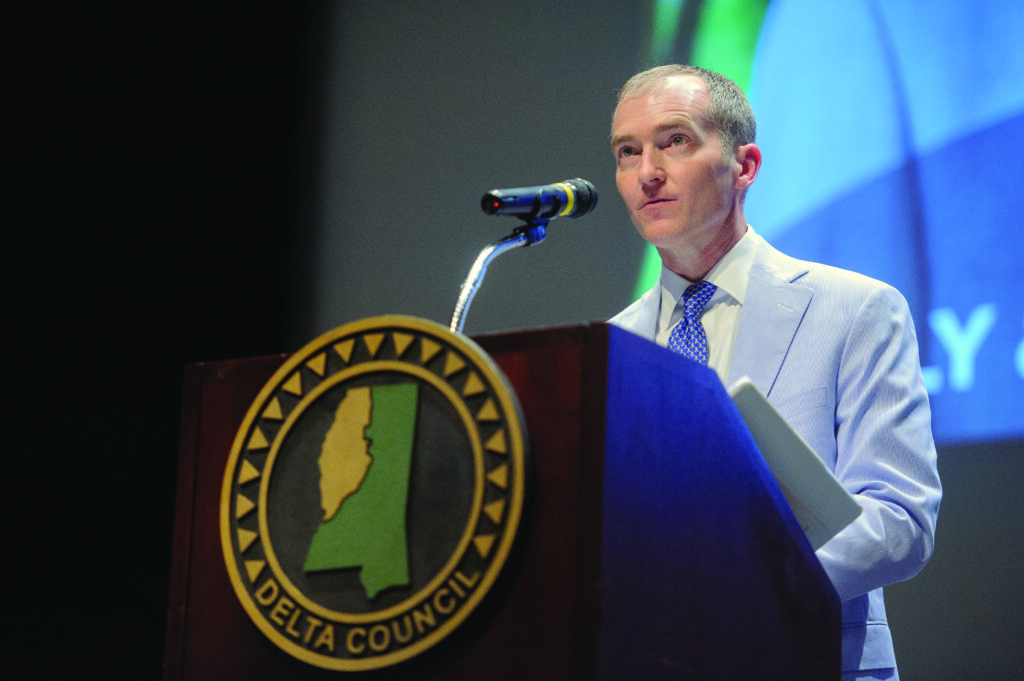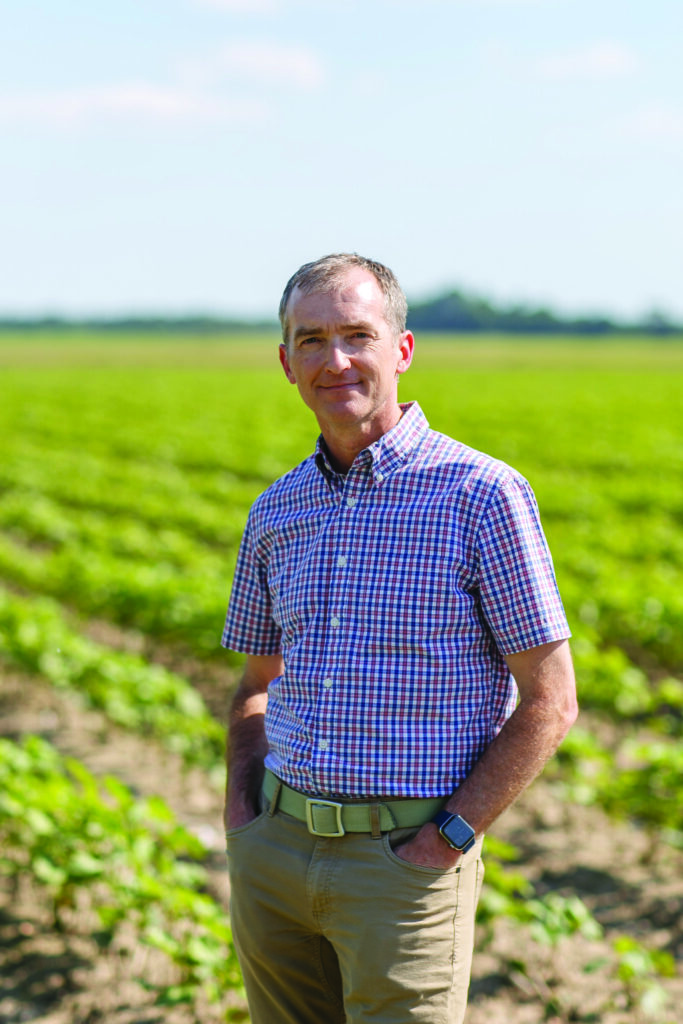New Delta Council President hitting the ground running
By Becky Gillette • Photography by Austin Britt
Patrick Johnson, forty-seven, the new president of the Delta Council, is the fourth generation in his family to be involved in a large agricultural operation in Tunica County. His family also provides aerial spraying through Tunica Air. And, while agriculture is still king in the Delta, Johnson is also dedicated to promoting other economic development efforts in the Delta while also working to protect groundwater and serving as an advocate for the Delta with state and federal government officials.
“Patrick has a strong working knowledge of farm policy, economic development, the issuing related to the Mississippi Alluvial Aquifer, and other key issues that are critical to the viability of the Mississippi Delta’s economy,” says Buddy Allen, a Tunica agri-businessman who is the CEO of the American Cotton Shippers Association. “I believe that Patrick will do a wonderful job leading Delta Council. He has been an excellent leader for Delta Council and the National Cotton Council in recent years. Further, Patrick has an excellent working relationship with Frank Howell, Delta Council’s Executive Vice-President. I have been in business with Patrick for over twenty years and could not be more proud to claim him as a partner and a friend.”
Bowen Flowers says it is good see a younger person with Johnson’s talents and dedication leading the regional economic development organization.
“He is a great pick to be Delta Council President,” Flowers says. “He has been very involved with the Cotton Council and is on the Mississippi Commission on Environmental Quality. I’m very happy with him being president. He is involved in so many different things in addition to agriculture and is really good for this position because of that. He is a bright, young leader, for sure. As a former Delta Council President myself, I’m aware it takes a lot of time commitment. We have pressing issues such as a devastating flooding in the South Delta. Talking to elected officials about these kinds of issues is a big part of the job.”
Frank Howell, executive vice president of Delta Council, says they are excited about Johnson’s year as president.
“Patrick has been a long-time leader in his community and the region, and Delta Council will be the beneficiary of his wisdom, experience, and inherent sense of fairness,” Howell says. “Patrick has served as the chairman of Delta Council’s Farm Policy Committee the past several years, a past chairman of Delta F.A.R.M., and has served his local community and church in numerous capacities of leadership.”
Johnson has found his years of involvement in Delta Council have been a very educational experience. In addition to learning more about how ag works in the Delta, there is a major emphasis on issues that affect the quality of life in the Delta such as health care availability and workforce training.
“I think it is an incredibly important organization, something definitely worth spending time on,” Johnson says. “As a region, our communities are facing a lot of the same challenges. I think being able to pool our resources and combine our efforts makes the Delta Council more effective. We are not just ag. The economic development side is a huge part of the work. For example, recently we had the good news that Milwaukee Tools is expanding their operations in the Delta.”
Another huge issue is transportation, working to make sure roads and bridges are improved and maintained.
“That is critical for any industry that might want to locate in the Delta,” Johnson says. “Those are basic things that have to be taken care of for any type of business to thrive in the Delta, ag or non ag. There are issues with adequate roads and bridges. There are improvements to roads and bridges that need to occur to make sure growers can get their crops to markets. Detours are costly and inefficient. Not being able to take the best direct route increase costs. And we want to see continuing progress to extend I-69 through the Delta, which is critical to attract future development.”
The outlook for ag has improved in 2021. Producers are more hopeful for better profit margins this year. Johnson says prices for all commodities have improved significantly.
“When you look at the range of cotton prices over the past 50 years, current prices are in the upper part of that range,” Johnson says. “After an extended period of low commodity prices, there is more optimism heading into 2021. Cotton prices are strong, but corn and soybeans are competitive depending on how someone’s operation is set up. We have cotton equipment, and our cotton acreage this year will be similar to 2020. However, we could see a slight decline in cotton acreage in the area due to strong corn and soybean prices.”
A major motive for volunteering to be on the Mississippi Commission on Environmental Quality was concern about declining aquifers as irrigation water is critical to the Delta Ag.
“I wanted to make sure that we have some presentation from the Delta with the agency that regulates our water use,” Johnson says. “”The Water Sustainability Taskforce continues to make progress, and we had a ribbon cutting recently for a Corps of Engineers groundwater injection project. This is just another step that we hope will be helpful in trying to address the problem. The adoption of water saving irrigation practices is still growing, as well.”
He also has his eye on promoting flood control.
“We have a situation where people are suffering in the South Delta in the middle of a manmade ecological disaster almost every year,” Johnson says. “This is a top priority of the Delta Council, and I feel like some progress can be made there.”
Johnson is also a member of the National Cotton Council Environmental Task Force, and has been involved in working with bees and other pollinators on their farm demonstrating that ag can co-exist with a healthy environment.
Johnson says things like the weather and volatile commodity markets will always create challenges for Delta farmers. There are also new challenges emerging that will change the way farmers do business. For example, consumers’ interest in sustainability and traceability in ag products continues to grow.
“However, those types of challenges can also be viewed as opportunities, and I’m confident Delta agriculture is ready to take advantage of that,” Johnson says.
Like other rural areas of the country, most of the Delta is losing population. Johnson says economic development efforts like the Delta Strong, a regional branding, marketing, and business attraction program. He also sees good workforce training initiatives as the key to keeping people in the Delta and attracting new residents. “Creating jobs and improving education and health care make the Delta a better place to live,” he says.
What does he like best about living in the Delta? He says there are many things that make the Delta a special place to live, but if he had to name one, it would be the people. “It’s a diverse group of genuinely hospitable people who have a desire to work together to solve problems,” Johnson says.
Johnson and his wife, Emily, live in Tunica and are members of the Tunica Presbyterian Church where Johnson enjoys singing in the choir. He also plays the guitar, rides a bicycle, and runs for exercise.







